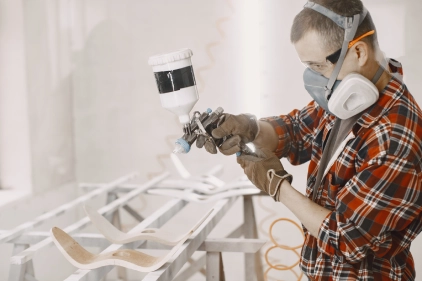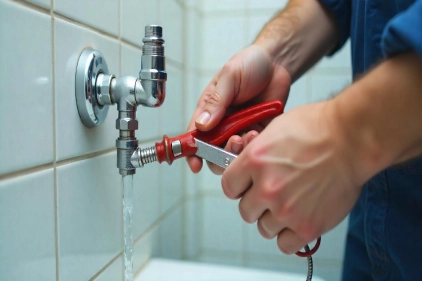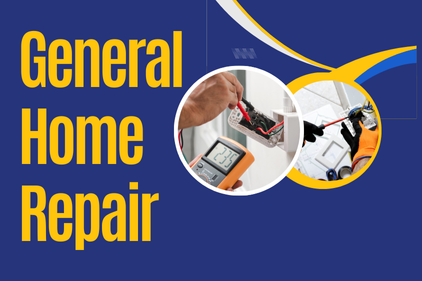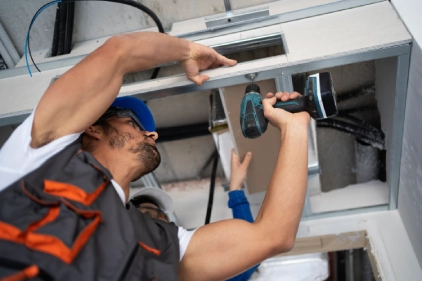Avoiding Common Home Repair Fails – Essential Tips for Successful Projects

Home repairs are vital for keeping your property in excellent condition, but not every project goes as planned. While many tasks are completed without issues, some seemingly simple home repairs can quickly spiral into costly disasters. These home repair fails are surprisingly common but can often be avoided with the right education and preparation.
In this blog, we’ll delve into some of the most frequent home repair mistakes and provide actionable tips to help you avoid delays, unnecessary expenses, and frustrating outcomes.
1. Underestimating the Scope of the Work
One of the most frequent mistakes homeowners make is underestimating the complexity of a project. What might appear to be a quick fix can quickly escalate into a much larger issue. For example, a minor plumbing leak could lead to significant water damage if not addressed properly.
Pro Tip:
Before starting any project, take the time to research and fully understand the scope of work involved. Evaluate whether the project aligns with your skills and available resources. Preparing for potential challenges ensures you can manage expectations and avoid costly home repair fails.
2. Missing Tools
Attempting a repair without the proper tools is a recipe for disaster. Using the wrong equipment—like fixing something with an inappropriate screwdriver—can worsen the problem, waste time, and even lead to injuries. Many home repair fails happen simply because people underestimate the importance of using the right tools for the job.
Pro Tip:
Ensure you have all the necessary tools before starting any project. If something is missing, consider renting or borrowing the required equipment. Investing in professional-grade tools can save time, reduce effort, and help you avoid delays and messy outcomes.
3. Ignoring Safety Precautions
Safety should always be the top priority during home repairs. Whether you’re handling electrical work, using power tools, or working on a ladder, neglecting safety measures can result in serious accidents like falls or electrical shocks—common causes of home repair fails.
Pro Tip:
Wear appropriate safety gear, such as gloves, goggles, and sturdy footwear. Always follow safety guidelines for the tools and materials you’re using. If you’re unsure about proper safety procedures, consult a professional to protect both yourself and your property.
4. Missing Permits and Regulations
Skipping necessary permits to save time or money often backfires. Failing to secure the proper permits can lead to legal issues, fines, or even a complete redo of the work to meet building codes—classic examples of home repair fails.
Pro Tip:
Visit your local building department to determine if your project requires a permit. Ensuring compliance with regulations not only prevents legal headaches but also guarantees the safety and quality of your work. Hiring a qualified contractor familiar with local building codes can help you navigate these requirements and avoid costly mistakes.
5. Picking the Wrong Materials
Using low-quality or inappropriate materials is another common pitfall. For instance, choosing the wrong type of paint or unsuitable plumbing fixtures can result in complications, poor results, and additional expenses down the line. These types of mistakes are among the most frequent home repair fails that homeowners regret later.
Pro Tip:
Take the time to research and select materials that are suitable for your specific project. When unsure, consult an expert for guidance. Investing in high-quality materials ensures durability, enhances the overall outcome, and helps you avoid future home repair fails.
6. Not Allowing Enough Time
Rushing through a home repair project often leads to poor workmanship and costly mistakes. These errors can snowball into larger issues, requiring even more time, effort, and money to fix.
Pro Tip:
Plan your project timeline carefully and allow for breaks if needed. Taking your time ensures that each step is completed correctly and thoroughly, reducing the risk of expensive errors. A patient and methodical approach prevents repair fails and delivers higher-quality results.
7. Failing to Seek Professional Help
Many homeowners attempt projects beyond their skill level, leading to frustration and damage. While DIY repairs can be rewarding, tasks like electrical work or structural fixes require professional expertise to avoid serious home repair fails.
Pro Tip:
Don’t hesitate to call a professional when needed. While it may seem expensive upfront, hiring a contractor can save you from making mistakes that result in even higher costs down the line.
8. Overlooking Small Leaks
Small leaks are often ignored, but they can cause significant damage over time. A leaking pipe, faucet, or roof can lead to mold growth, water damage, and even structural issues if left unattended—classic examples of costly home repair fails.
Pro Tip:
Regularly inspect your home for hidden leaks before they escalate. Address any leaks immediately to prevent further complications. Tackling small issues early can save you from extensive damage, expensive repairs, and potential health hazards caused by mold or mildew.
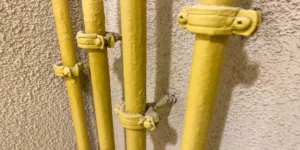 9. Not Planning for Clean-Up
9. Not Planning for Clean-Up
Cleaning up after repairs is often overlooked, but skipping this step can lead to long-term damage and safety hazards. For instance, spilled paint or scattered tools may harm your home’s surfaces or create risks of accidents—classic examples of home repair fails.
Pro Tip:
Set aside dedicated time for clean-up after completing your repair. Removing debris and restoring order not only enhances your home’s visual appeal but also prevents future damage or accidents. A clean workspace ensures a safer and more functional environment.
10. Ignoring Previous Repairs
Neglecting the root cause of a problem makes prior repairs ineffective, leading to repeated issues. For example, fixing a bathroom wall without addressing the underlying water damage will result in recurring repairs and more costly home repair fails.
Pro Tip:
Always investigate and resolve the underlying issue before starting repairs. By treating the root cause, you can achieve long-lasting results and avoid unnecessary rework. This approach saves time, money, and frustration in the long run.
11. Inadequate Research
A lack of proper research is a leading cause of home repair fails. Homeowners who dive into projects without understanding the required steps often waste time, money, and energy, only to worsen the problem.
Pro Tip:
Research thoroughly before starting any repair. Watch tutorials, read detailed instructions, and consult professionals when in doubt. Adequate preparation ensures a smoother repair process, minimizes mistakes, and saves you from unnecessary stress and expenses.
12. Poor Budgeting to Save Money
Underestimating the costs of a project can derail your progress. Running out of funds often results in incomplete or poorly executed repairs—one of the most common causes of home repair fails.
Pro Tip:
Create a detailed budget that accounts for materials, tools, and professional help if necessary. Always leave room for unexpected expenses to avoid financial strain. A well-thought-out budget ensures your project is completed successfully while avoiding costly delays or subpar results.
13. No Contingency Plan
Unforeseen issues are almost inevitable in home repairs. Without a well-thought-out contingency plan, unexpected delays or additional costs can quickly derail your project, often leading to home repair fails.
Pro Tip:
Always plan for contingencies. Allocate extra time and set aside a portion of your budget for unexpected expenses, such as material shortages or unforeseen structural issues. This proactive approach ensures your project stays on track, even when challenges arise.
14. Neglecting Aesthetics
Even small aesthetic oversights, such as mismatched colors, uneven finishes, or poorly aligned fixtures, can ruin the overall look of your repair. Ignoring these details often leaves projects feeling incomplete or unprofessional, contributing to home repair fails.
Pro Tip:
Focus on the finishing touches to elevate your project. Pay attention to color matching, alignment, and texture. These small yet impactful details can transform your repair into a polished, professional-looking result that enhances your home’s appeal.
15. Assessing Your Skills and Knowledge
Taking on a repair project without evaluating your abilities can lead to avoidable mistakes and unexpected costs. Overestimating your skills often results in home repair fails, leaving your home in worse shape than before.
Pro Tip:
Be honest about your capabilities. If a project feels overwhelming—like fixing a wall properly or addressing kitchen cabinets—don’t hesitate to consult a contractor. This approach can save money, prevent mistakes, and ensure the repair is done right.
16. Understanding Home Systems
A lack of understanding about your home’s systems—such as plumbing, electrical, or HVAC—can escalate minor issues into costly repairs. Missteps in these areas often lead to expensive home repair fails.
Pro Tip:
Learn the basics of your home’s systems. For example:
- Know how to handle quick fixes like resetting a breaker or unclogging a drain.
- Understand the signs of larger problems, like faulty wiring or HVAC inefficiencies, to avoid major mistakes.
When in doubt, call a contractor to address complex issues. This proactive approach ensures your whole house remains functional and safe.
17. Wall and Ceiling Repairs
Uneven or patchy finishes on walls and ceilings can significantly detract from your home’s appearance. Without the right techniques, even minor repairs can become frustrating and lead to dissatisfaction with the final result.
Pro Tip:
Take the time to learn proper patching and painting techniques. A seamless, freshly painted finish not only enhances the overall look of your property but also ensures your repairs blend in perfectly with the surrounding area.
Conclusion
Home repairs don’t have to be overwhelming or riddled with mistakes. With careful planning, the right tools, and attention to detail, you can avoid the most common home repair fails. Whether you’re tackling a small DIY project or working with a professional, preparation is the key to achieving successful results.
If you’re facing a complicated or overwhelming home repair project, don’t hesitate to contact the experts at ROR Home Repair. Our experienced team can guide you through the process, ensuring your repairs are completed safely, professionally, and correctly.
Visit us at ROR Home Repair or connect with us on our Facebook page for more information. Let us help you keep your home in top shape while avoiding costly home repair fails down the road!
 FAQs
FAQs
1. What are the main indications that a home repair project might turn into a disaster?
The most common signs include:
- Underestimating the scope of work: Misjudging the time, tools, or materials required.
- Using improper tools: This can lead to incomplete or ineffective repairs.
- Neglecting safety precautions: Increases the risk of accidents or damage.
- Rushing through tasks: Often results in poor-quality repairs that worsen over time.
Avoid these pitfalls by planning thoroughly and ensuring proper techniques are used.
2. How do I ensure that my home repair project stays within budget?
To keep your repair project on track financially:
- Estimate all costs upfront: Include materials, tools, and professional services.
- Create a well-defined budget: Allocate extra funds for unexpected emergencies.
- Account for every expense: Poor budgeting is one of the leading causes of repair project failures.
Proper planning helps prevent overspending and ensures your repairs are completed without financial stress.
3. How do I know when it’s best to call a professional for help?
If you’re unsure about the complexity of the project, such as:
- Electrical work,
- Major plumbing repairs, or
- Structural issues,
It’s best to consult a professional. Attempting repairs beyond your skill level can lead to extensive damage, costly fixes, and even safety hazards. Hiring an expert ensures the repair is done correctly, saving you time and money in the long run.
4. What are the dangers of not having permits when repairing a house?
Skipping permits can lead to:
- Legal troubles, fines, or penalties.
- The need to dismantle and redo your project.
- Non-compliance with local building codes, which may pose safety risks.
Additionally, unpermitted repairs can complicate future renovations or even lower your property value during a sale. Always check your local regulations before starting a repair project.
5. Why is it important to check for leaks before starting repairs?
Unattended leaks can cause:
- Mold growth,
- Water damage, and
- Costly repairs later on.
Hidden leaks are especially dangerous because they often go unnoticed until the damage becomes severe. To avoid unnecessary complications, always inspect for leaks before beginning any repair. This simple step can save you from future home repair fails.
6. How can I ensure I’m using the appropriate materials for a repair project?
Choosing the right materials is essential to avoid repair project failures. Follow these tips:
- Use materials specifically designed for the type of repair, whether it’s plumbing, flooring, or painting.
- Consult experts or read reviews to confirm the materials are high-quality and durable.
- Avoid cutting corners with cheap materials, as this can lead to future issues like peeling paint, cracked walls, or leaky plumbing.
Investing in the right materials ensures your repairs last longer and maintain the value of your property.
7. What are the most common causes of home repair fails?
Some of the most frequent reasons include:
- Underestimating the scope of work: This leads to rushed or incomplete repairs.
- Using improper tools: The wrong tools can damage materials or produce subpar results.
- Ignoring safety precautions: This increases the risk of accidents and property damage.
- Skipping steps, like not preparing a wall properly before painting or patching.
Avoiding these mistakes ensures your repair project is successful and saves you from costly rework.
8. How can I prevent small repair issues from becoming larger problems?
Prevention is key to avoiding frustrating home repair fails. Here’s how:
- Perform regular maintenance, such as checking for leaks, cracks, and signs of wear.
- Address minor issues promptly to prevent them from escalating into bigger, more expensive problems.
- Hire a professional for complex repairs beyond your expertise.
By staying proactive, you can keep your home in top shape and avoid unnecessary expenses.

